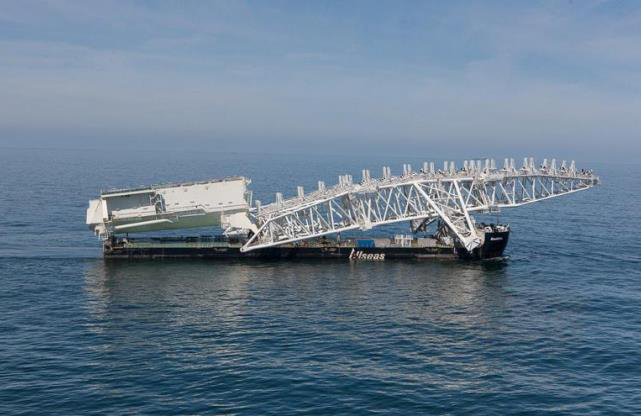Twój koszyk jest obecnie pusty!
Business vs. Foreign Policy. Commentary for New Eastern Europe
In spite of sanctions and appeals of the international community, Russians go on fighting against Ukrainians in Donbas. After a deadly rocket attack on the city of Mariupol, the West has been considering a new set of sanctions. Beyond disconnecting Russia from using the SWIFT system, another Russian energy company may be affected – Rosatom.…

In spite of sanctions and appeals of the international community, Russians go on fighting against Ukrainians in Donbas. After a deadly rocket attack on the city of Mariupol, the West has been considering a new set of sanctions. Beyond disconnecting Russia from using the SWIFT system, another Russian energy company may be affected – Rosatom.
On January 15th 2015, members of the European Parliament voted in favour of imposing sanctions on Sergey Kiriyenko’s company. This topic will be also discussed during the extraordinary meeting of the EU Foreign Affairs Council to take place on January 29th. The last such meeting took place on January 19th but it did not bring any conclusions. Thirty casualties of the Mariupol shelling could change this situation and convince Europeans to introduce further sanctions which will punish Russia for its actions in the east of Ukraine.
Imposing sanctions on Rosatom would be an extension of activities undertaken in April 2014 by the United States when it put nuclearsecurity cooperationwith Russiaon hold. Back in September 2013, the US and Russia signed an agreement on the control of use of highly enriched uranium and plutonium extracted from disarmed nuclear warheads. An agreement was a part of the so-called “reset” policy in relations between the two countries and the denuclearisation promoted by Barack Obama before the annexation of Crimea took place.
A vast part of the cooperation between Rosatom and the US was based on cooperation between private entities, so it was not blocked after the Russian intervention in Ukraine. Although sanctions imposed on the Russian energy sector so far have been labelled by Russians as “cosmetic,” Rosatom has been intensively lobbying against imposing sanctions on the nuclear sector. „Nuclear should be out of all political discussions, all temporary disagreements, because it is a very sensitive area and first and foremost it is all about safety,” said Kirill Komarov Rosatom’s deputy director-general in September 2014. He also tried to convince the international public that there is no basis for claiming that Russia could use its nuclear arsenal against any country. He was referring to the media reports mentioning such a possibility after the Kremlin announced that part of its nuclear tactical weapons were deployed in Crimea.
Rosatom made great efforts to prove to the West that it is a reliable business partner. In spite of very difficult relations between Russia and Ukraine, Rosatom continues to supply fuel for the operating plants in Ukraine. Komarov even praised Kyiv for its timely payments and effective cooperation. In the meantime, Ukrainian Energoatom has already announced plans for a partial decrease in reliance on Russian fuel and a switch to the American partner, Westinghouse. Russian experts, however, claim that American technology does not suit Ukrainian reality, but some analysts – Polish specialists from technical universities – see no major obstacles in such a switch and point out that it has never been a real problem.
Imposing sanctions on Rosatom may only foster a process which has been already ongoing in some countries. Bulgaria’s nuclear industry is also going to cooperate with Westinghouse. The American company may also enter Finnish and British markets in order to fill the gaps left by Rosatom in case sanctions come into force. The “shale gas revolution” in the US is also a factor that made new sanctions more possible. Cheap natural gas made nuclear power less competitive so the US is considering shutting down several working nuclear reactors.
This is a high-stakes game. In December 2014, Rosatom disclosed that its foreign contracts portfolio for ten years exceeded 100 billion US dollars after Russia signed an agreement with India to build 12 nuclear energy reactors over 20 years. Rosatom is also planning to extend the Paks nuclear power plant in Hungary. The company also has large interests in Finland – yet in December 2014, the Finnish parliament, ignoring worsening relations with Russia and the appeals of the EU, agreed on the creation of a Russian-Finish joint venture to work on nuclear investments.
The UK, on the other hand, has been addressing cooperation with Rosatom more carefully. Rosatom signed a contract for a strategic partnership with the UK, but after the annexation of Crimea, the British government has been revising the agreement. It is, however, still in effect as of now.
Sergei Kiriyenko, the head of Rosatom, stressed recently that “none of Rosatom’s partners has resigned from signed contracts so far.” He added that such contracts are sometimes longer than a human’s life and are longer than any political cycle. This is why Rosatom, including all of Russia’s nuclear facilities and managed mostly by scientists, has been trying to minimise the negative impact of Putin’s military adventures in Ukraine on business with the West. Rosatom presents different rhetoric than Gazprom and tries to present itself as a transparent and reliable partner. In January 2015, a KPMG audit confirmed that the Russian company introduces the highest standards and transparency in its daily work.
In spring 2014, Rosatom made certain steps to improve its image on the European market, including an advertising campaign in several national languages. I was invited by Rosatom to attend ATOMEXPO 2014, an event which took place in Moscow in June 2014. All costs were covered by the organizers. However, due to the political situation I decided not to go. This strategy can be compared to the campaign run by Gazprom, which provides journalists with press materials containing nothing but promotion of Russian policy. They are different but both equally ineffective.
Read also: Don’t Give our Gas Mistrals to Russia
Rosatom is aware that sanctions could finally also reach the nuclear sector. On January 22nd 2015, Rosatom issued an announcement in which it identified the US for maintaining current cooperation. Rosatom attracted Americans with an availability of 500 metric tons of uranium for use in the American economy. But apart from the carrot, there is also the stick. In 2012, Rosatom provided 13 per cent of uranium for 104 nuclear power plants in the US. Half of the highly-enriched uranium purchased by the US from Russia came from the Megatons to Megawatts Program, which is also called the United States-Russia Highly Enriched Uranium Purchase Agreement, signed by the two countries in 1993. This is one of the reasons why the nuclear lobby in the US will most likely be strongly opposed to any sanctions that could hit Rosatom. To the nuclear lobby in the US, it is also important to keep a 30-year deal with Rosatom on peaceful usage of nuclear energy, which was signed on January 11th 2011.
An important factor that will shape Washington’s decisions on this issue will also be the separatist policy of Hungarian Prime Minister Viktor Orban, who invited Putin to Budapest on February 19th. Orban wants to continue strategic cooperation with Russia in spite of the Ukrainian crisis. The Paks nuclear power plant in Hungary, which provides 42 per cent of electric energy for the country, is going to be built by Russians. In order to succeed with this project, Moscow would provide Hungary with a loan.
Even if Americans are ready to impose new sanctions, the position of the EU is not certain. Many European states, except Finland and Hungary, will most likely be against sanctions against the Russian energy sector. These are, for example, Sweden, Netherlands, Belgium, Bulgaria, Germany, France, Spain, United Kingdom, Czech Republic, Slovakia, Lithuania, and Slovenia. The only thing that will force democratic governments to introduce new sanctions are new Russian attacks in Ukraine.
Read also: Not Existing Gazprom’s Projects
Russian analyst-emigrants suggest that Vladimir Putin may ignore this possibility as well. Gleb Pavlovsky, Olga Kryshtanovskaya and other commentators who are believed to be independent from the Kremlin point out that Putin has been under increasing influence of siloviki – officials who come from the security or military services—and has isolated himself from the business circles. The business lobby inside Russia, as Pavlovsky decribes it, is too weak to calm down Putin’s “Ukrainian adventure”. The recent trial of Russian tycoon Vladimir Yevtushenkov, an important shareholder of oil producer Bashneft – who could become a new Khodorkovsky – was meant to serve as an example and has put business elites back in order.
Lucrative Rosatom’s investments in Europe may fall victim to Russia’s policy in Ukraine. Moscow will probably try to balance the negative impact of sanctions by active cooperation with Asian or certain Western partners such as Hungary. New sanctions, however, will not have a great impact on the condition of the Russian economy, which is dependent on oil and gas. The real threat for the Russian economy, however, would be an exclusion from the SWIFT system, which would cut Russia off from the last streams of western money, and the sanctions on the Russian oil and gas sectors such as introduction of import duty. It would be truly bad news for Putin, but no one in the West is ready yet to take such a step.
Source: New Eastern Europe





Leave a Reply